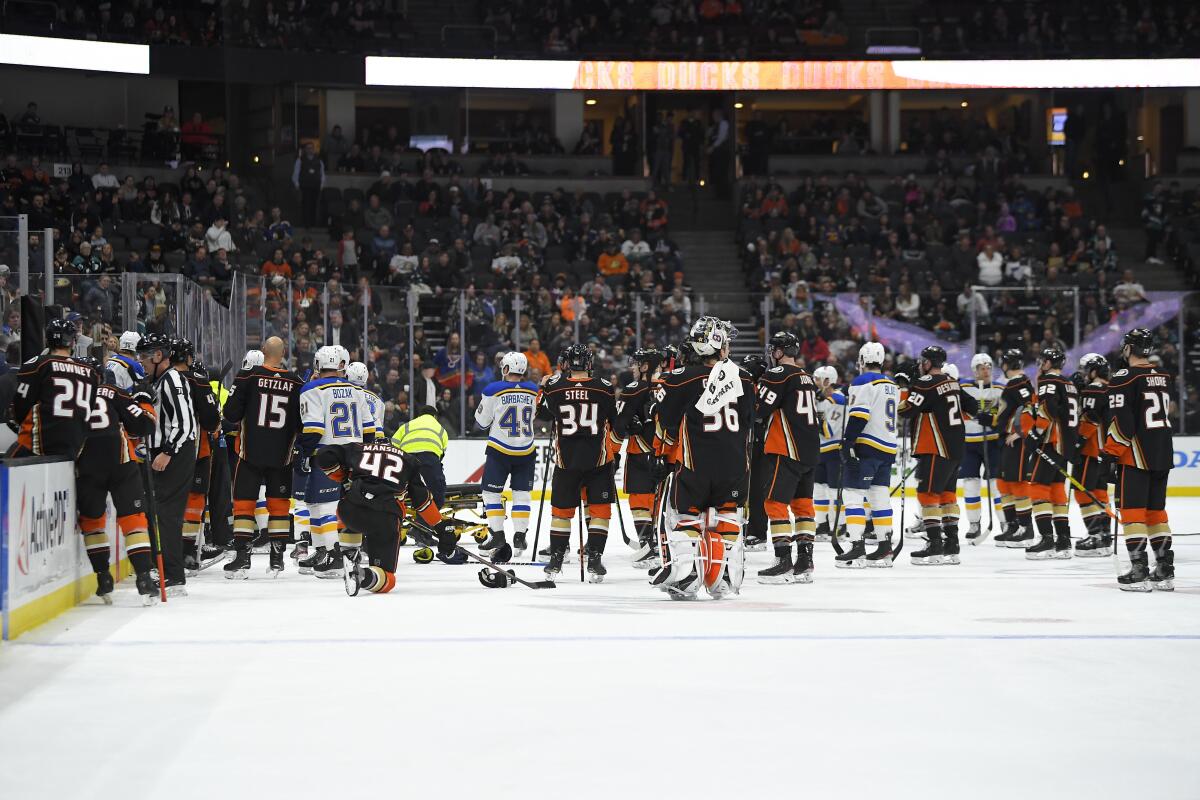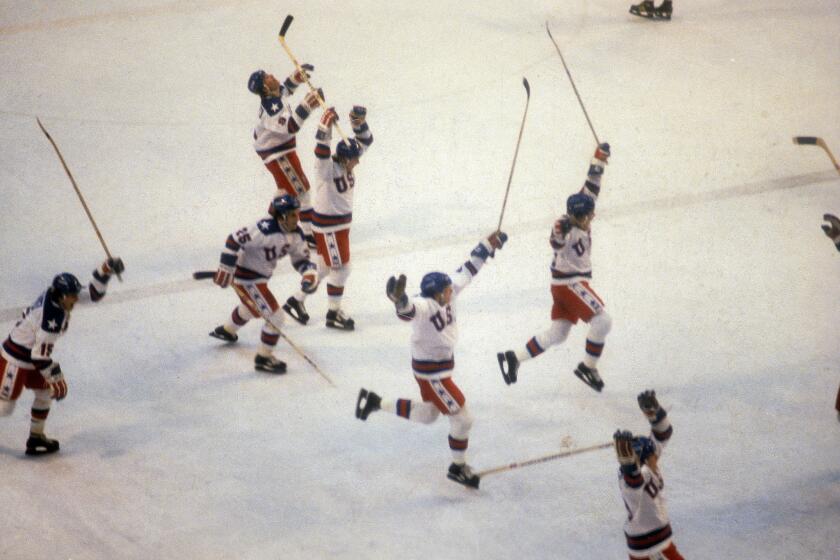NHL observations: Poised reaction by Ducks medical personnel saved Jay Bouwmeester’s life

- Share via
St. Louis Blues defenseman Jay Bouwmeester, a Stanley Cup champion, son, husband and father, is alive because the right combination of people, preparation and procedures were in place when he went into sudden cardiac arrest while sitting on the visitors’ bench at Honda Center on Tuesday.
Trainers, doctors, equipment managers and emergency medical personnel put their training to swift and seamless use by applying compressions within about a minute and bringing Bouwmeester back to life with an automated external defibrillator after he had lost consciousness.
“Studies will show us every minute that goes by after an event, the survivor rate decreases by about 10%. So every minute is crucial, which is why we practice this as a group,” said Ducks medical director Dr. Kenton Fibel, one of many who tended to Bouwmeester. “Because basically every second that ticks by, you’re losing your chance at a potential ability to save someone’s life.”
Bouwmeester, 36, was alert when he was taken by ambulance to UCI Medical Center in Orange. On Friday, he had an implantable cardioverter defibrillator placed in his chest to monitor his heartbeat and shock his heart back into a regular rhythm if needed.
Angels pitcher-turned-broadcaster Mark Langston underwent the same procedure last September after his heart stopped while he was in the radio booth in Houston.
Bouwmeester will remain in Southern California until he’s cleared to return to St. Louis. “There is never a good time for something like this to take place, but there could not have been a better location than the Honda Center,” Blues general manager Doug Armstrong said in a statement. “Thanks to everyone at the Honda Center and the Ducks’ organization for their life-saving efforts.”
The NHL’s rigorous emergency medical requirements contributed to the positive outcome. Key provisions mandate the home team must have at least three physicians at every game, seat them within 50 feet of the benches, and have a red bag of emergency medical supplies near each bench.
“Every building we go to has that same bag with the same contents, so we know when we roll up what we have and we’re prepared,” Ducks assistant athletic trainer Chad Walker said. “That was probably the most important thing we had on the bench that night.”
Those who sprang into action don’t see themselves as heroes, though they are. All they want is for all teams to be prepared for emergencies like this one. They also hope the general public will recognize the value of being trained in life-saving measures and of having a functioning AED close by. “Because those are the two biggest things to potentially save a life,” Fibel said.
The crisis erupted when Bouwmeester came off the ice and slumped over during a first-period TV timeout. Blues defenseman Vince Dunn saw it and waved his arms to get attention. He was quickly joined by teammate Alex Pietrangelo.
Blues trainer Ray Barile was the first to respond, and it was clear he’d need help. “They started yelling, ‘Trainer,’ and as soon as that happened, I jumped over the boards and I went to their bench,” said Ducks head athletic trainer Joe Huff, who got a boost in that direction from Ducks captain Ryan Getzlaf. “They were removing the bench at that point so I helped remove the bench and then went to Jay’s side.”
Blues equipment manager Joel Farnsworth got the AED from the red bag and gave it to Huff. “You don’t think. It’s just reaction,” Huff said.
Walker followed procedures that trainers, team physicians and team equipment managers have set and practiced at their annual summer meetings when he thrust his fist skyward to alert paramedics. “It’s the universal sign,” Huff said Friday. “Every arena we go. Put your fist in the air. As soon as that happens, it signals everybody.”
Players’ poise also helped. “If you watch the clip you can actually see Pietrangelo, as soon as he sees something is wrong, he sprints right over to the Zamboni tunnel,” Walker said. “I don’t think he was ever directly told that’s where help is, but they know that’s where the ambulance guys are when they need to get them out.”
A video of the incident exists but won’t be released for privacy reasons. It will be reviewed by trainers and doctors to see what they can do better in the future. “I think overall that we were happy with everyone who participated and did their part. It took a lot of everyone coming together and each person did a different role that allows us as a team to accomplish an outcome that obviously we were very happy with,” Fibel said.
The Blues-Ducks game was postponed and hasn’t been rescheduled. Each team lost its next game but the most important win was saving Bouwmeester’s life.
“The initial shock was pretty tough but it was good news once he pulled through and was OK,” Getzlaf said. “Now it’s about his personal well-being for life. Hockey is kind of a side note at that point.”
The more things change ...
The timing of Bruce Boudreau’s dismissal as coach of the Wild was curious. Minnesota had won seven of 11 games and was within three points of a wild-card playoff spot when general manager Bill Guerin fired him and appointed assistant Dean Evason interim coach.
“There are just some things that I feel need to be better and I feel Dean is a guy that has a good grasp on that and he’s going to be able to execute it,” Guerin told reporters.
Boudreau, the eighth NHL coach fired this season, had long terms with Washington and the Ducks. He’s 16 games short of 1,000 games as a head coach.
No miracle for Mark Pavelich
Mark Pavelich won’t join fellow members of the 1980 U.S. Olympic hockey team next week in Las Vegas when they commemorate the 40th anniversary of their stunning upset of the Soviet Union and gold-medal triumph over Finland.
He’s still in a mental facility in Minnesota, where he was committed last year after he was judged “mentally ill and dangerous” and incapable of standing trial on charges he had beaten a neighbor with a metal pole. A hearing to evaluate his health was postponed from mid-February to April.
Former New York Rangers teammate Barry Beck has lobbied for financial and medical help for Pavelich, and the NHL Alumni Assn. has joined the cause. Olympic captain Mike Eruzione, whose game-winner against the Soviets was assisted by Pavelich, said the 1980 team is behind him too.
Surviving members of the U.S. team will gather next week in Las Vegas to celebrate the 40th anniversary of their victory over the Soviets and gold-medal triumph over Finland two days later.
“Unfortunately, Pav is dealing with some health and mental issues, and we’re hoping he gets the help and treatment that he needs,” Eruzione said. “As a team, we totally support him. He was a great teammate and a really good person. Unfortunately, there’s been some issues with his mental health and his health in general, and we hope he finds what he needs.”
Twin tributes
The Vancouver Canucks staged a classy ceremony Wednesday to retire the uniforms of Henrik and Daniel Sedin, their franchise scoring leaders and two of the best players and people who ever graced an NHL rink. Kevin Bieksa hit the right notes of humor and emotion as the master of ceremonies. Who knew?
More to Read
Go beyond the scoreboard
Get the latest on L.A.'s teams in the daily Sports Report newsletter.
You may occasionally receive promotional content from the Los Angeles Times.








